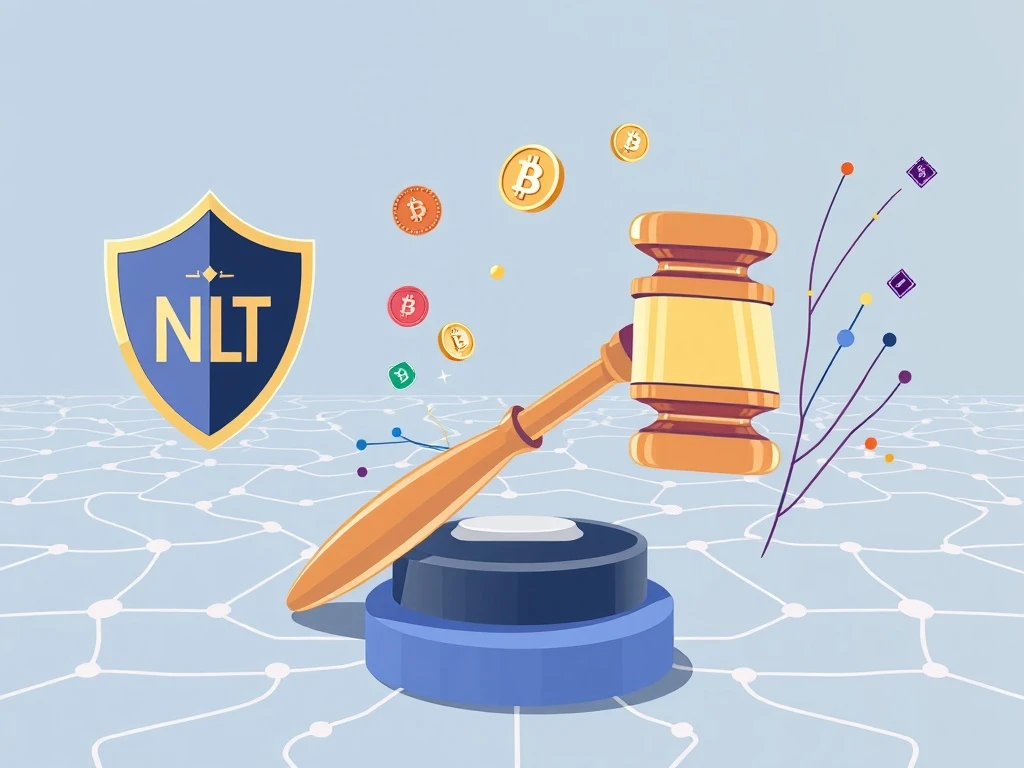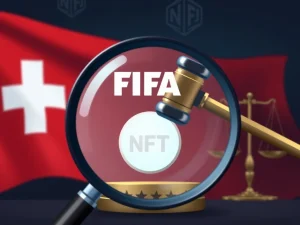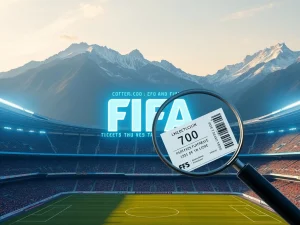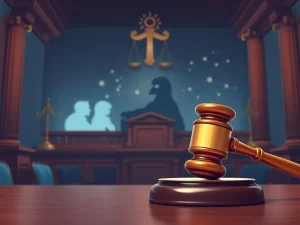Revolutionary NFT Trademark Ruling: Ninth Circuit Classifies Digital Collectibles as Goods, Fortifying Web3 IP

In a move that sends ripples across the digital landscape, the U.S. Court of Appeals for the Ninth Circuit has issued a landmark decision, fundamentally reshaping the legal standing of Non-Fungible Tokens (NFTs). For anyone invested in cryptocurrencies, digital art, or the burgeoning Web3 ecosystem, this ruling marks a pivotal moment, particularly concerning NFT trademark protection. No longer just digital files, NFTs are now legally classified as “goods,” a classification that could dramatically alter how intellectual property is protected and enforced in the decentralized world.
What Exactly Happened in the Ninth Circuit NFT Ruling?
The core of this transformative decision stems from the high-profile case between Yuga Labs, the creators behind the iconic Bored Ape Yacht Club (BAYC) NFT collection, and artist Ryder Ripps. Ripps had created a series of “lookalike” NFTs, marketing them as “expressive appropriation art.” Yuga Labs, however, viewed these as unauthorized copies infringing on their established brand.
The Ninth Circuit sided with Yuga Labs, delivering a resounding affirmation of traditional intellectual property (IP) rights within the digital asset ecosystem. Key takeaways from the ruling include:
- NFTs as “Goods”: The court’s most significant declaration is the classification of NFTs as “goods” under U.S. trademark law, specifically the Lanham Act. This means NFTs now receive the same legal safeguards as physical products, enabling creators to combat unauthorized replication and consumer deception more effectively.
- Rejection of Fair Use/First Amendment: Ripps’ claims of fair use and First Amendment immunity were rejected. The court emphasized that despite artistic intent, Ripps’ project directly competed with Yuga Labs’ offerings and risked misleading buyers, prioritizing brand protection over unregulated artistic expression in commercial NFT markets.
- Precedent Set: This decision sets a powerful precedent, indicating that trademark rights are enforceable even in decentralized digital markets. While the case was remanded to a lower court to assess whether “consumer confusion” occurred, the Ninth Circuit’s stance is clear.
Why is This Yuga Labs Lawsuit So Significant for Digital Asset IP?
The implications of the Yuga Labs lawsuit extend far beyond this single case, reverberating throughout the entire Web3 ecosystem. This ruling provides much-needed clarity and a stronger foundation for the burgeoning digital economy.
For various stakeholders, the impact is profound:
- NFT Creators: This ruling validates the commercial value of digital collectibles, providing a robust legal framework to defend against copycats and counterfeiters. It encourages innovation by assuring creators their work can be protected.
- Collectors and Consumers: Enhanced assurance of authenticity means collectors can invest with greater confidence, knowing that their digital assets are backed by legal protections against deception.
- Marketplaces: Platforms facilitating NFT trades face heightened obligations to enforce IP policies, potentially leading to more stringent listing requirements and improved vetting processes. This could foster a more trustworthy environment.
- Legal Professionals: The ruling necessitates adaptation to the evolving interplay between blockchain technology and IP law. It establishes a benchmark for future disputes, demanding a new understanding of digital rights.
- Investors and Brands: The decision signals that the NFT space is maturing, fostering conditions for sustainable growth and attracting more traditional brands and investors who seek legal certainty for their digital ventures.
In essence, this classification brings a level of legal certainty that has long been sought in the often-unregulated world of digital assets. It acknowledges the economic significance of NFTs and the necessity to protect the investments of creators and collectors alike.
Navigating the Future of Web3 Legal Precedent: Challenges and Opportunities
While the Web3 legal precedent set by the Ninth Circuit is a monumental step forward, challenges certainly persist. The decentralized and global nature of NFTs inherently complicates enforcement, particularly across diverse jurisdictions. The pseudonymous nature of some actors and the immutability of blockchain records can create hurdles for traditional legal remedies.
However, these challenges also catalyze innovation:
- On-Chain IP Solutions: The ruling could spur the development of new on-chain IP solutions, such as smart contracts designed for automated dispute resolution or digital rights management embedded directly into NFTs.
- Industry-Wide Standards: It may encourage the establishment of industry-wide standards and best practices to mitigate conflicts and ensure greater accountability within the digital asset space.
- Balancing Act: The ongoing challenge will be to strike a delicate balance between protecting intellectual property rights and fostering artistic freedom. The digital economy must remain dynamic and equitable, allowing creativity to flourish while ensuring creators are compensated and consumers are protected.
This case underscores the critical importance of aligning technological innovation with legal clarity, offering a blueprint for resolving future disputes in the digital age.
What’s Next for NFT Trademark Protection?
The next phase of the Yuga Labs vs. Ripps case will pivot to determining whether Ripps’ NFTs caused actual consumer confusion. The outcomes here will provide crucial insights into the practical application of the court’s broader ruling on NFT trademark protection. Regardless of the specific outcome of the remand, the Ninth Circuit’s classification of NFTs as “goods” marks a pivotal shift, affirming that Web3’s growth must coexist with established legal principles.
As the NFT market continues its evolution, this precedent will likely encourage more robust IP strategies among creators and businesses. This includes proactive trademark registrations for digital collections and transparent terms of use for NFT holders, clearly outlining what rights come with ownership. The balance struck between artistic expression and commercial rights in this case sets a tone for future debates, ensuring that creativity thrives within a framework of accountability and fairness.
This landmark decision solidifies the legal foundation for NFTs, moving them from a nebulous digital concept to tangible, protectable assets. It’s a clear signal that as the digital economy expands, so too will the legal frameworks designed to protect its participants. For creators, collectors, and innovators, this is not just a legal victory; it’s a profound validation of the value and legitimacy of digital ownership in the modern age.
Frequently Asked Questions (FAQs)
1. What does the Ninth Circuit’s ruling mean for NFTs?
The Ninth Circuit ruled that NFTs are classified as “goods” under U.S. trademark law. This means they receive similar legal protections as physical products, allowing creators to enforce their intellectual property rights against unauthorized copies and consumer deception.
2. Why was the Yuga Labs vs. Ryder Ripps case important?
This case was pivotal because it involved a major NFT creator (Yuga Labs) defending its brand against “lookalike” NFTs. The court’s decision rejected claims of fair use and First Amendment immunity for commercial purposes, setting a precedent for how trademark law applies to digital assets.
3. How does this ruling impact NFT creators and collectors?
For creators, it provides a stronger legal framework to protect their digital art and brands, encouraging innovation. For collectors, it offers greater assurance of authenticity and value, as their investments are now better protected against counterfeits.
4. What are the challenges for enforcing IP rights in the NFT space?
Challenges include the decentralized and global nature of NFTs, which complicates cross-jurisdictional enforcement. Additionally, pseudonymous actors and the immutability of blockchain records can make traditional legal remedies more difficult to apply.
5. What is the Lanham Act, and how does it relate to NFTs now?
The Lanham Act is the primary federal statute governing trademark law in the U.S. By classifying NFTs as “goods,” the Ninth Circuit has extended the scope of the Lanham Act to cover digital collectibles, providing a legal basis for trademark infringement claims in the NFT market.
6. What are the next steps in the Yuga Labs vs. Ripps case?
The case has been remanded to a lower court to specifically assess whether Ryder Ripps’ “lookalike” NFTs caused actual “consumer confusion.” The outcome of this assessment will help shape the practical application of the broader ruling.









